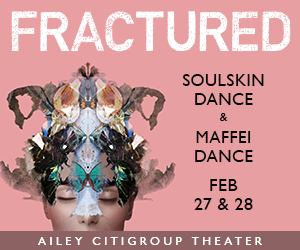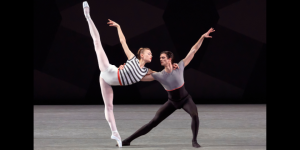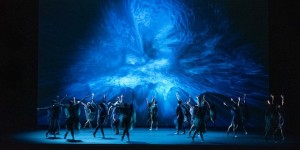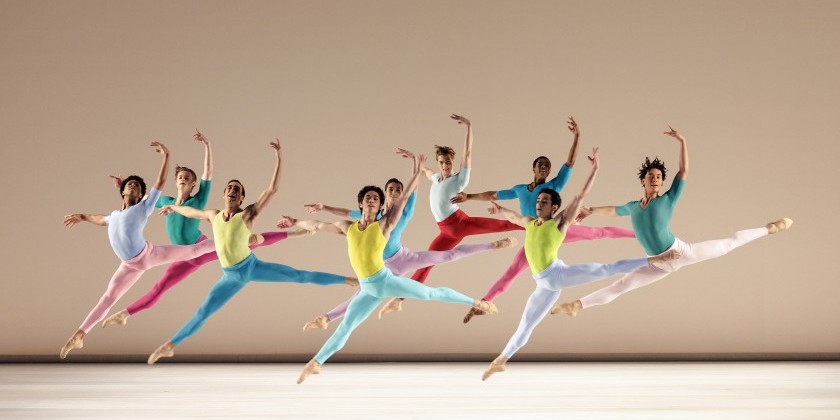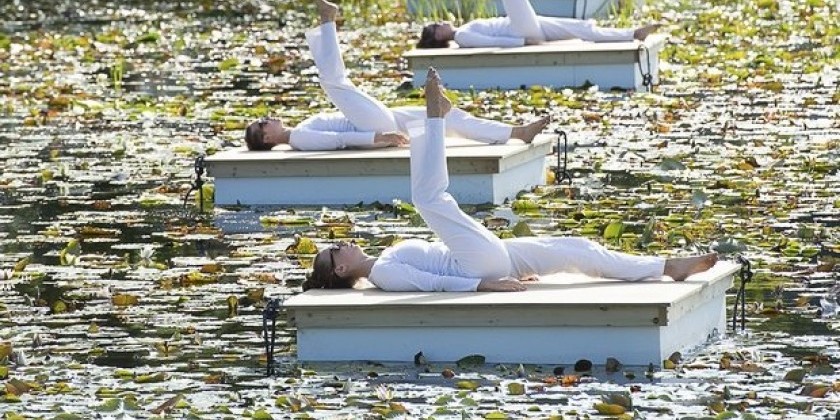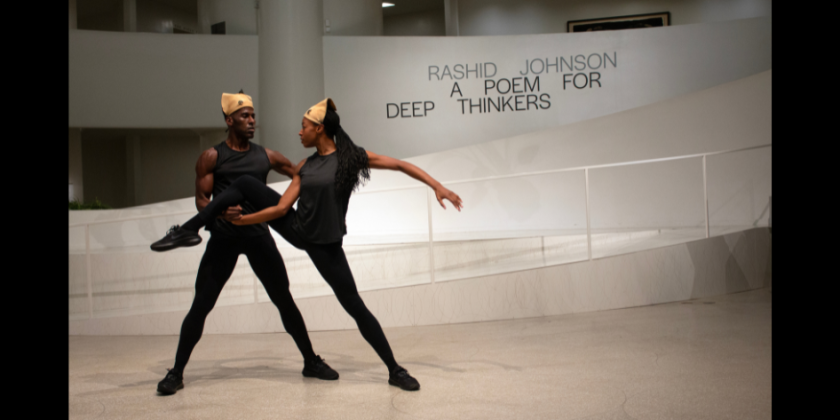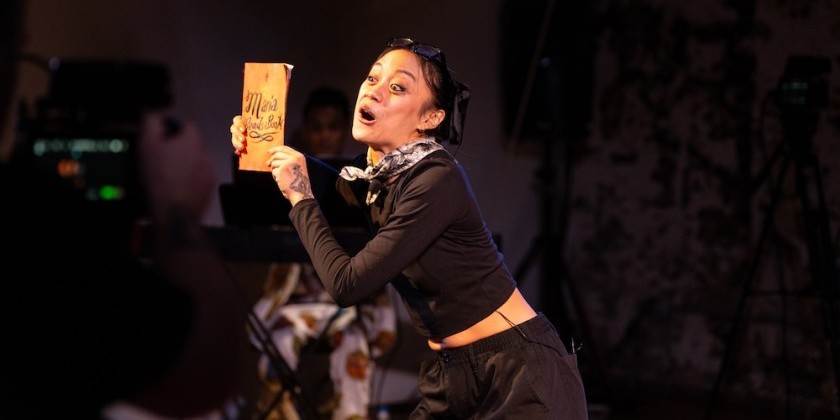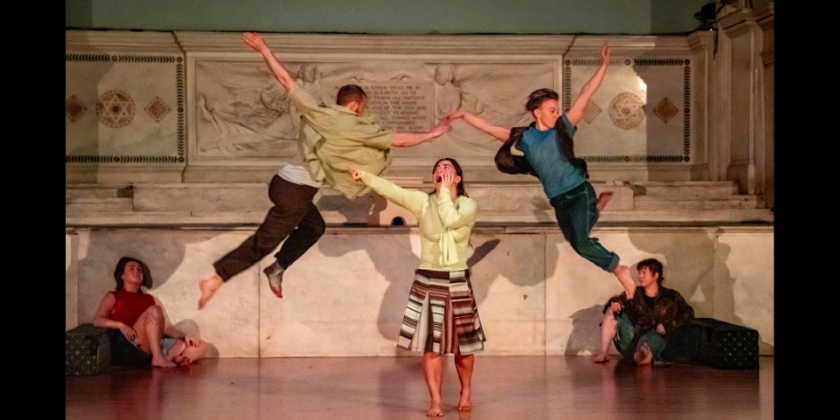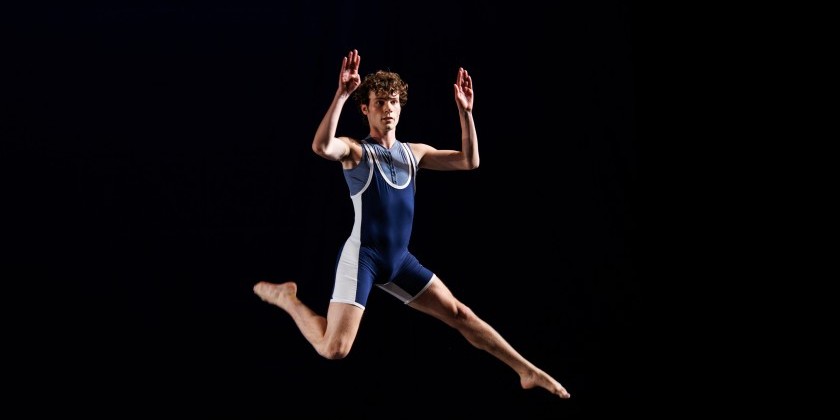IMPRESSIONS: Justin Peck, Sufjan Stevens and Jackie Sibblies Drury’s "Illinoise"

Music and Lyrics: Sufjan Stevens (based on the album Illinois)
Story: Justin Peck and Jackie Sibblies Drury | Direction and Choreography: Justin Peck
Cast: Kara Chan, Ben Cook, Jeanette Delgado, Gaby Diaz, Robbie Fairchild, Christine Flores, Jada German (swing), Zachary Gonder (swing), Rachel Lockhart, Dario Natarelli (swing), Tyrone Reese (swing), Craig Salstein, Ahmad Simmons, Byron Tittle, Ricky Ubeda, Alejandro Vargas
Music Direction and Supervision: Nathan Koci
Music Arrangements and Orchestrations: Timo Andres
Vocalists: Elijah Lyons, Shara Nova, Tasha Viets-VanLear
Band: Christina Courtin, Sean Peter Forte, Domenica Fossati, Daniel Freedman, Kathy Halvorson, Nathan Koci, Eleonore Oppenheim, Brett Parnell, Brandon Ridenour, Kyra Sims, Jessica Tsang
Scenic Design: Adam Rigg | Lighting Design: Brandon Stirling Baker | Sound Design: Garth MacAleavey
Costume Design: Reid Bartelme and Harriet Jung | Props Design: Andrew Diaz | Masks: Julian Crouch
According to the veritable deluge of digital billboards and social media ads filling my subconscious lately, Illinoise is the hottest ticket in town. Based on Sufjan Stevens’s seminal 2005 pop-rock album "Illinois," director and choreographer Justin Peck and playwright Jackie Sibblies Drury attempt to layer in narrative and dance with musical theater styling and sensibility. With a fourteen-piece band and a stellar ensemble of twelve dancers, the production — commissioned by the Park Avenue Armory and developed the Fisher Center at Bard with a run of previews earlier this year at the Chicago Shakespeare Theater — certainly does not lack for talent and support in its quest for a Broadway run, yet somehow the production falters, embarrassingly at points, and rings disconcertingly hollow.
I was nineteen years old when "Illinois" dropped, and its sprawling symphonic expressions of youthful emotional extravagance hit a spot in my heart at the time. I was coming of age in a flurry of migration and change: think long, lonely road trips and a tenuous grip on the makings of adulthood in my first New York apartment. It’s a time to remember, but certainly not one for which I’m particularly nostalgic. While of course I am here today because of all that happened all those years ago, that young woman feels strange, remote, and almost entirely changed. And in fact, as I listened to "Illinois" on my commute to the Armory, I found even my ears had changed — the music itself is a time capsule I’d rather not open.
I’m certainly not the only millennial of a certain age for whom "Illinois" holds a dear, if dusty, place in the heart. Unfortunately, Illinoise’s resurrection of the album falls prey to a rather ubiquitous pop culture wave of millennial nostalgia for which I struggle to find a meaningful resonance. Sure, the transition from adolescence to adulthood was a terrain fraught with seismic change and a roller coaster of feelings, but for many millennials (myself included), that terrain has not eased in the ensuing decades of social, economic, and political catastrophe. In many ways we’re still coming of age, we’re still finding our footing, and through this endless slog that youthful sentimentality seems an almost vapid indulgence we can no longer afford. How can we be expected to remember that with fondness? How is this music helping us? What is this production doing, and who is it doing it for?
These questions circulated on a loop as my habitually open mind clouded and my incredulity mounted. Don’t get me wrong: the music and dancing are positively resplendent throughout, with lush arrangements, impeccable sound design, impassioned vocals, bustling dance numbers, razor sharp technique, and ample emotionality on full display. It’s perhaps this generous surplus of talent and support that prevents Illinoise from seeing itself for anything other than an overblown homage to a narrowly sentimental moment.
Peck and Sibblies Drury sketch just enough story for the vignettes to cohere into something more than a jukebox musical, as the cast gathers and disperses to tell stories around a campfire. The show’s program features illustrated journal entries that rather cloyingly attempt to draw the viewer into the story and tie in Stevens’s lyrics. The central figure is a frumpy, reticent young man whose story unravels a laundry list of personal travails: the queer closeted youth, the migration from small town to big city, the break with a childhood friend, the friend’s loss of a lover to cancer, the loss of the friend to addiction and suicide, and the subsequent struggle to find and accept himself, connect with community, and receive love. These are by no means small issues, but their theatrical and dramaturgical treatment falls far short of their weight. The stories attempt to use a personal lens to gloss broader political issues with surface-level treatments of historical and social maladies, none of which probe bravely enough to take a strong stance.
In terms of dancing, the work overflows. Illinoise eschews dialogue — gratefully, as a script may have only exacerbated its problems — in favor of a movement language that muddles between literal and abstract expression. Peck’s movement signatures are on full display: fleet feet, restlessly wheeling arms, lively unisons and knotty groupings, all deployed with an ever-present musicality that is at times almost too on the nose. The dancers are fully committed and faultless throughout, perhaps to their own detriment, as they are the kind of artists that can make any movement mean just about anything with the right imposition of tone and affect. But how many emotions can a smooth triple spin that stops on a dime authentically evoke?
Peck is well known for his versatility with movement—the fresh dynamics of his partnering, the nervy danceability of his variously clustered and riotous ensembles, the human intimacy he lends to an expansive ballet technique—but with Illinoise his inventions rapidly devolve into flat tropes. At its most literal, the combination of movement and stagecraft is downright pandering — masked historical zombies complete with nameplates, a very creepy John Wayne Gacy clown, cartoony posturing in Superman t-shirts — and prove difficult to watch. Even more difficult are recurring sequences of mimed road trips in which the cast shines LED flashlights directly into the audience’s eyes. I’m not sure how that got past rehearsals.
To be honest, I wanted to like Illinoise. And for some, it does resonate. The show has been picked up for a 16-week run on Broadway at the St. James Theater beginning April 24. As a commercial enterprise, the show may very well succeed with a ready-made audience of Stevens fans. But as a work of dance, as a work of theater, and as a work of art, its appeal is confoundingly empty of invention and significance. Perhaps 19-year-old me might have liked it, but for anyone outside of that specific generation and that particular moment, it’s more than likely to strike a false note.
Fans of Peck’s dancemaking may be better off seeing four of his dances at New York City Ballet this spring: a world premiere and his In Creases in the Classic NYCB I program May 3-16, his Year of the Rabbit (also to a Stevens score) in the Classic NYCB II program May 8-26, and his Pulcinella Variations in the All Stravinsky program May 10-25. It is in his longtime Lincoln Center home that Peck cements his place in the ballet firmament, both in the lineage of Balanchine and Robbins and alongside closer contemporaries including Pam Tanowitz, Christopher Wheeldon, and the fast-rising Amy Hall Garner. Kudos to Peck for pressing into the commercial arenas of Broadway and film—for the time being, I’ll continue to enjoy his work on the concert stage.



